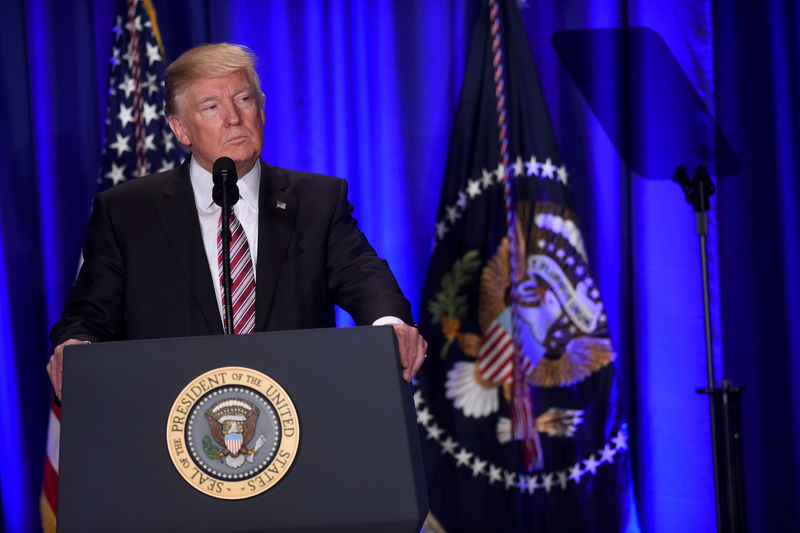Moody’s downgrades Senegal to Caa1 amid rising debt concerns
By Geoffrey Smith
Investing.com -- President Donald Trump pushes back the timeline for reopening the U.S. economy and dramatically raises his estimate for the fatalities to be expected from Covid-19. The dollar is finding a floor as stresses continue in international markets, with South Africa's currency hitting a record low after the country's debt rating was cut to junk. The pound sterling is also lower after a downgrade from Fitch. China's central bank is easing again, but oil prices are cratering again on the loss of more demand for a longer period of time. Here's what you need to know in financial markets on Monday, March 30th.
1. Trump to keep U.S. distancing in place longer; sees higher death toll
President Donald Trump pushed back his timeline for reopening the U.S. economy, citing the risks of letting the Covid-19 outbreak spiral further out of control.
In a press conference on Sunday, Trump extended the federal guidelines on social distancing measures to the end of April.
He also sharply increased his estimates of the pandemic’s impact even in a best-case scenario, saying that keeping the U.S. death toll to between 100,000 and 200,000 would mean that “we, altogether, have done a very good job.”
That would imply that the U.S. still has the worst of the pandemic ahead of it: Johns Hopkins data put the total number of U.S. deaths from Covid-19 only at 2,500 so far, with over 143,000 confirmed cases.
2. Oil prices hit 17-year low on outlook for U.S. demand
Oil prices tumbled to a 17-year low after President Trump pushed back the timeline for reopening the U.S. economy, creating an even more pressing problem of near-term oversupply.
Goldman Sachs (NYSE:GS) analysts estimate that global oil demand last week was some 26 million barrels a day below pre-pandemic levels.
By 6:15 AM ET (1015 GMT), U.S. crude futures were down 4.6% at $20.52, having earlier dipped as low as $19.92 a barrel. Brent crude futures were down 4.8% at $26.62, bouncing from an intra-day low of $25.16.
3. U.S. stocks sete to open mixed
U.S. stocks are set to open mixed in the wake of Trump’s comments. By 6:15 AM ET (1015 GMT), the Dow Jones 30 futures contract was down 71 points, or 0.2%, at 21,398. The S&P 500 futures contract was flat and the Nasdaq 100 futures contract was up 0.1%.
The dollar, meanwhile, was finding a floor after its precipitous decline in the last week. The dollar index rose 0.4% against a basket of developed market currencies, rising against the pound after Fitch downgraded the U.K.’s credit rating at the weekend.
The dollar was also strong against most emerging market currencies, and hit a new all-time high against the South African rand on Sunday, before consolidating gains on Monday. It also hit its highest in nearly two months against the Egyptian pound, amid reports that banks had been instructed to limit withdrawals and deposits.
4. China rejoins the monetary easing party
China’s central bank rejoined the ranks of global central banks easing monetary policy, after a hiatus. The People Bank of China cut its seven-day reverse repo rate, a key reference point for its other benchmark rates by 20 basis points to its lowest-ever rate 2.2%.
The official yuan rate stayed broadly stable within its recent range around 7.09-7.10 the dollar, while the offshore yuan rate weakened to 7.1050.
Elsewhere, China’s largest banks warned that their asset quality could suffer later in the year due to the post-pandemic recession, despite posting better-than-expected results for the latest quarter. Anecdotal reports out of China indicate that the actual mortality rate in Wuhan was far higher than official data admitted.
5. Banks cut dividend payouts, EasyJet grinds to a halt
European banks started to suspend their dividend payments and buybacks under pressure from their supervisor, the European Central Bank.
Unicredit (MI:CRDI), which had earlier this year outlined plans for its first buyback in a decade, and Dutch giant ING (AS:INGA) were among the biggest to suspend payouts, as did Bank of Ireland (IR:BIRG). ABN AMRO (AS:ABNd), which warned of a $200 million clearing loss on a single client last week, also suspended payouts and warned of a heavy quarterly loss.
Cash conservation measures stepped up in the travel sector too. EasyJet (LON:EZJ) grounded its entire fleet, putting its workforce on a state scheme that will pay 80% of their wages up to a certain threshold.
